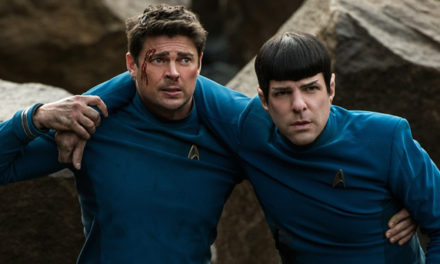Jonathan Frakes Interview:
On Star Trek Politics,
Illegal Productions &
Next Generation Reunions
Photo by Flickr user JD Hancock (CC BY 2.0)
by Evelyn Reid
Originally Published on About.com September 9, 2014
Having had the opportunity to talk with (and get chastised, Riker-style) by Star Trek: The Next Generation actor/director Jonathan Frakes prior to his appearance at the 2014 Montreal Comiccon where he joins the whole cast of TNG for a special group panel event, we delved into everything from Frakes’ thoughts on the proliferation of independent Star Trek shows and webisodes to the story behind his infamous ‘walk’, the one even Chris Farley spoofed on Saturday Night Live in 1994.
And in the name of hope springing eternal, I got an answer to the question every TNG fan wants answered: what would it take to get the cast of Star Trek: The Next Generation back on the big screen?
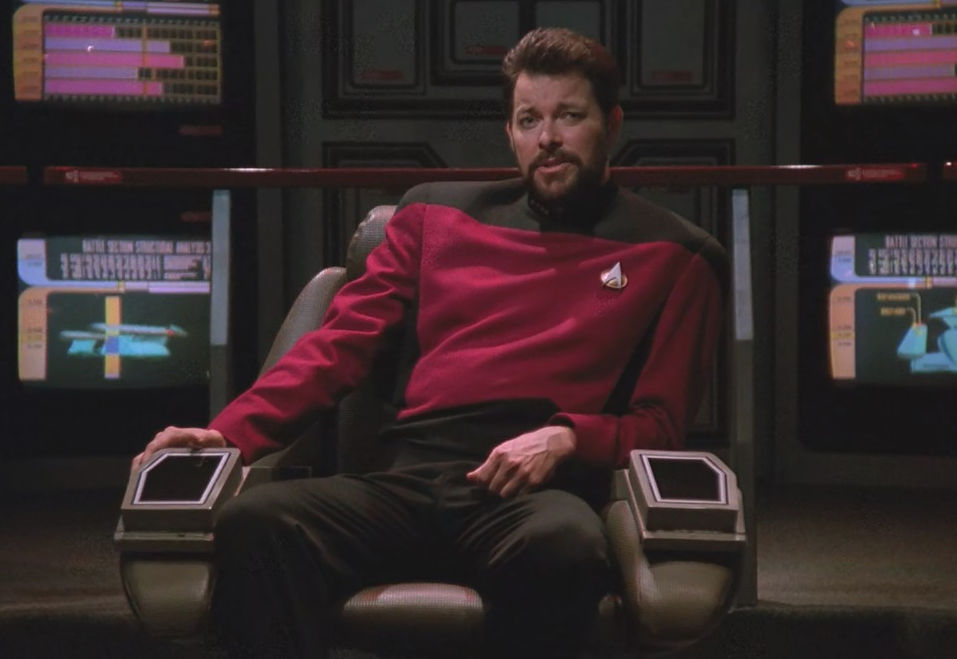
Jonathan Frakes: Evelyn Reid!
Evelyn Reid: Jonathan Frakes! May I call you Jonathan?
Jonathan Frakes: Of course.
Evelyn Reid: First of all, Jonathan, thank you taking the time to chat. I realize you’re very busy. Lots of Comiccons, last week’s Fan Expo and other circuits happening! There’s so many of them. I dunno how you keep up.
Jonathan Frakes: [Laughter].
Evelyn Reid: You know, we haven’t seen you in Montreal in a while now. When was the last time?
Jonathan Frakes: I don’t know that I’ve been there for a convention. I’ve visited [Montreal] because my wife worked with somebody from outside of Montreal when she was on All My Children. Jean Leclerc. But I dunno… it’s been long time, let’s put it that way.
Evelyn Reid: Hmm, I have on pretty good authority from someone who attended a Montreal sci-fi convention around 1993 or 1992, give or take. He swears that you were there.
Jonathan Frakes: That follows.
Evelyn Reid: Was a long time ago.
Jonathan Frakes: God knows the Godfather of us all has a building named after him here.
Evelyn Reid: [Laughter]. That he does. On topic, I’m just a few blocks away from the house William Shatner grew up in. So Jonathan, getting back to the Comiccon circuit, you have a lot experience with it. I mean, you were already on the circuit easily 25 years ago when you were shooting Star Trek: The Next Generation (TNG). With that being said, what do you enjoy most about the experience? What does it for you at these kind of events?
Jonathan Frakes: Well, first of all, it’s astounding to me that, 28 years later, people are still interested in coming out to see us. That alone is a blessing.
Evelyn Reid: Well I can tell you that not a week goes by where I don’t watch at least an episode.
Jonathan Frakes: Isn’t it amazing that you can still watch those shows, that they hold up? That’s a credit to the writing.
Evelyn Reid: A credit to the writing, a credit to the acting, a credit to the cast and crew’s rapport. You know, I wonder if it has something to do with substance… TNG and the Star Trek franchise overall are not afraid to look at shades of grey whereas mainstream entertainment these days and perhaps even in general? It’s about the black and the white. The plots are simple. Easy. Boring. Characters? You’ve got good guys and you’ve got bad guys. But with Star Trek: TNG, there’s the in-between. There’s a lot more subtlety in there to make you pause and reflect on whether you’re seeing things for what they really are.
Jonathan Frakes: Well that was Roddenberry’s vision, you know. He asked questions and used the format of this 24th century spaceship [to examine them]. He was very interested in exploring the human psyche. He’d touch everything except… he avoided talking about God. But generally, there was no subject off base for him.
Evelyn Reid: And even then he’d flirt with God. There were episodes that went there, one in particular comes to mind that looked into how a primitive culture might even form a concept of God.
Jonathan Frakes: Was that episode after he died?
Evelyn Reid: I don’t know offhand. I can’t remember what season it was. [Ed note: it was the fourth episode of Season 3, just prior to Roddenberry’s passing]. It was the one where the Prime Directive was violated—usually, those are pretty interesting episodes—and there was concern over the fact that this primitive culture, a pre-warp civilization, accidentally saw some of the Enterprise’s “magical” technology and started to believe that Captain Picard was some sort of God.
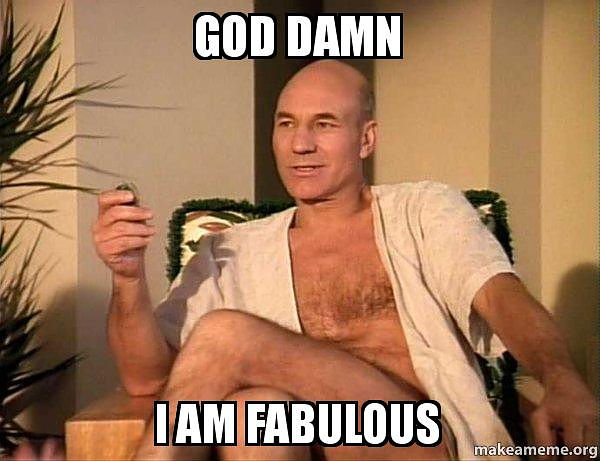
Jonathan Frakes: Oh I remember that! Yeah. Patrick loved that.
Evelyn Reid: [Belly laugh].
Jonathan Frakes: [Belly laugh].
Evelyn Reid: You know, when I was in high school in the ’90s, sharing how much you love TNG was not exactly the ideal topic of conversation. You didn’t broadcast your geekdomness, lest you risk becoming some sort of social outcast. But is it just me or have the tables turned? Have Comiccons and Star Trek become something that is not just socially acceptable, but cool?
Jonathan Frakes: You are not wrong. It’s a constant amazement to me. Now not only is it mainstream… it, it started with Third Rock and The Big Bang Theory, but now, it’s cool to be a geek. My daughter is in high school now and the nerds and the geeks? They’re the coolest people in school.
Evelyn Reid: That’s amazing.
Jonathan Frakes: And now we’ve got, pardon the pun, the next generation of fans coming out. A lot of people come in with their kids and say, “I’ve got my kids on Netflix watching your show,” and the kids will say [to me], “you look a lot older but you look like the guy from that show.” [Laughter].
Evelyn Reid: So the generation after the Millenials are also catching on to TNG?
Jonathan Frakes: They are if their parents have sat them down in front of [an episode]. If they’ve been fed it and it speaks to them, they stick with it. It is SUCH a treat for us. It’s amazing, just amazing that people still come out for us.
Evelyn Reid: And it amazes me that I don’t get bored, that TNG keeps speaking to me. I can keep watching the same episodes and never tire. Well, okay, not every episode. Some feel like the writers were having a bad day or didn’t have enough time to flesh things out…
Jonathan Frakes: They can’t all be home runs.
Evelyn Reid: Exactly. On topic, one of my questions later on when we wrap up our chat has to do with TNG’s original cast and whether we’ll ever you see you, all of you, together again on screen. But before we get there, I wanted to talk about this Star Trek spinoff movement, like Star Trek: Renegade for example. There’s also been talk of Michael Dorn’s spinoff efforts with Captain Worf. Independent producers and web series are popping up here and there. But chances are they won’t have the kind of production budgets that TNG had back in the day. Something everyday folk might not be aware of is how extensive your experience is behind the scenes, as a director, in addition to your work as an actor. With that experience in mind, do you have any advice for independents toiling to get their projects off the ground and who just won’t have the kind of budget previous series had?
Jonathan Frakes: Well, I took a Star Trek project to Paramount, to CBS, and they said, “you know what? We’re not gonna do this. We’ve already turned Shatner down, he brought one, Bryan Singer brought one… we love you guys but we’re not entertaining any new Star Trek television.” So people have gone to the internet and people have gone underground to make [something happen]. You know, they’re honoring the show, but they’re making it illegally, so I’m not sure what the answer is.
Evelyn Reid: Crap. Are they? I didn’t realize rights weren’t being cleared.
Jonathan Frakes: If they’re using the characters who were created without paying the writers who created those characters, if they’re filming and using the words “Star Trek” and not paying Roddenberry, that’s illegal. So there’s all kinds of shit going down that as a union man, that’s why I’m not involved.
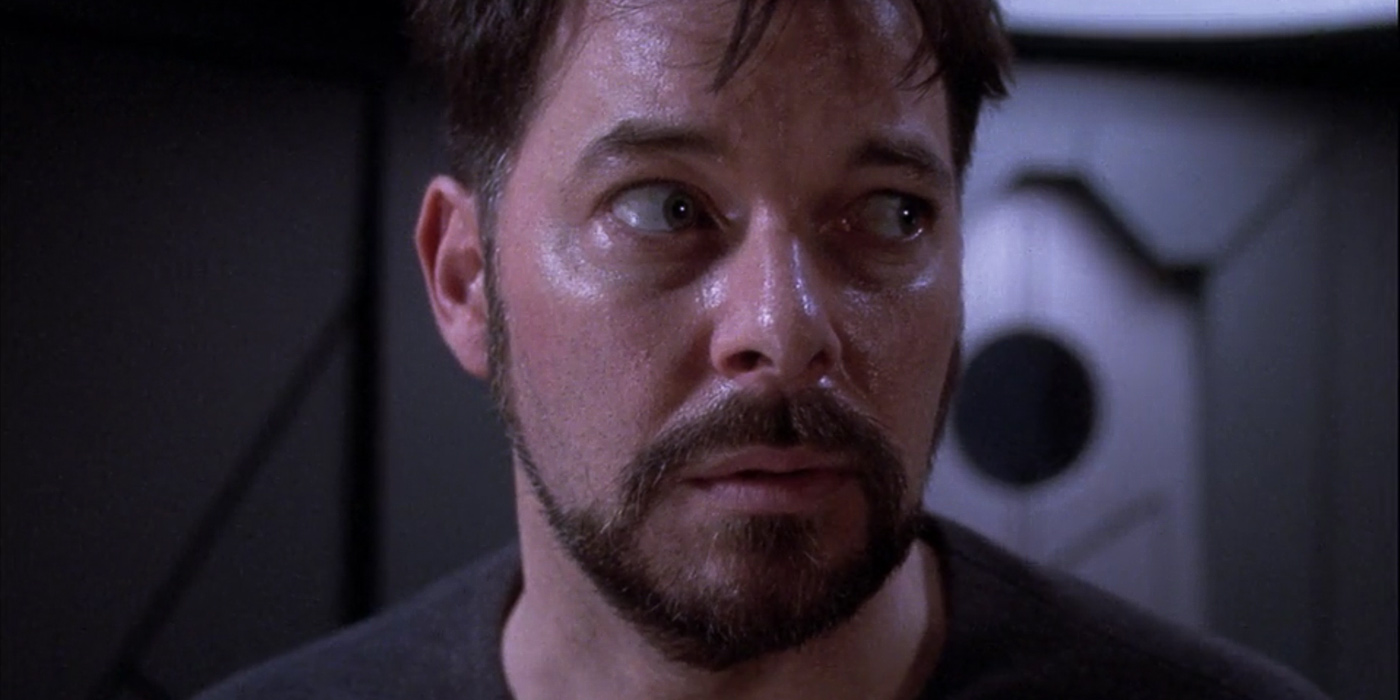
Evelyn Reid: I didn’t realize it. And I should know better considering I deal with plagiarism, copyright infringement and intellectual property issues on a regular basis. So what’s the latest?
Jonathan Frakes: Right. Now I know Tim Russ (Tuvok from Star Trek: Voyager) created a Star Trek-feeling show but once you use the words “Star Trek,” that’s a licensed name, [licensed intectual property] that CBS owns and if you use “Riker” or “Troi,” those were characters created by writers, by the the Roddenberry estate. It’s a very… there’s a grey area. And part of the reality is that Paramount and CBS are so thrilled with J.J. Abrams’ reboot movies and the fanbase is so strong that they don’t want to spread the seed the way they did when they had Next Generation, Deep Space Nine, Voyager, Enterprise and Star Trek: Nemesis as a movie out there at nearly the same time… there was so much Star Trek that Star Trek: Nemesis bombed and that was it. That was the end of our run.
Evelyn Reid: Yet ironically, Star Trek: Nemesis had such a poignant theme: nature versus nature, terrorist or freedom fighter. I don’t understand why fans didn’t like it. The film had such depth to it, it was relevant, it challenges our everyday perceptions of what is good and evil. And its examination of cloning at a time when it was a hot topic in the news…
Jonathan Frakes: I know. And it was written by John Logan, one of the greatest living TV and movie writers. The idea wasn’t that the film wasn’t good, it was that nobody showed up in theatres. It was the tenth Star Trek movie and it was the first Star Trek movie that didn’t make money. That’s where the decisions are made.
Evelyn Reid: Would you ever consider starting a crowdfunding campaign yourself? Considering the licensing issue, say you were to do everything by the book with the help of the franchise’s fanbase. Say every fan gave $10, could you realistically put something together? [Ed note: roughly 30 million people worldwide watch Star Trek programming every week. If only 10 million of those people donated $10 each, that would amount to $100 million, which is two thirds of the first reboot film’s production budget right there]. I mean, look at what LeVar Burton did with Reading Rainbow.
Jonathan Frakes: Isn’t that amazing? He got $5 million bucks.
Evelyn Reid: Astounding. And to think the government rejected Reading Rainbow, if indirectly. But the support for Burton’s Kickstarter campaign speaks volumes. And LeVar proved his point, going out there and ostensibly thinking, “you don’t want to fund it? Fine. But you know what? People WANT [Reading Rainbow] to exist.”
Jonathan Frakes: So proud of him.
Evelyn Reid: What if you did the same? Is this something that the cast of TNG could do?
Jonathan Frakes: I don’t know know if there’s an appetite. You know, if there was an appetite, I frankly think that Dorn’s project would have gotten off the ground and Tim Russ’ project would have gotten off the ground in a bigger way. Vic Mignona built sets in Georgia that are clones of the original series sets and they’re redoing episodes… there are a lot of people out there making, as you said earlier, Star Trek episodes or webisodes and if there were an appetite for a Next Generation project, we’d all love to do it.
Evelyn Reid: But how do you determine if there’s a sufficient appetite for TNG?
Jonathan Frakes: Well, we’d love to do it.
Evelyn Reid: A lot of fans would be thrilled if you did it. I want to get back to this key question later, but I also want to talk more about your production skills behind the scenes. I was watching some footage of you shooting the breeze with Marina Sirtis (Counsellor Troi on TNG)…
Jonathan Frakes: …oh, when we’re talking about Rikers in space?
Evelyn Reid: No, it was at a 2012 conference. The one where she was making fun of your shoulder thing…
Jonathan Frakes: The walk. She was making fun of my walk?
Evelyn Reid: The walk. I’ve always wanted to ask you. Where does it come from?
Jonathan Frakes: I stole that walk from a wonderful actor whom I emulated named John Cullum. He walked a little bit like John Wayne. And at some point, I just stole the walk and made it mine.
Evelyn Reid: And it just turned into a pop culture phenomenon from there. I remember doing that walk when I was 16. But to get back to Marina, she also said that in the 36 years of her career, you were the best director she’s ever worked with. What is it that you do that resonates so positively with the actors you direct? Marina’s compliment isn’t the first one I’ve heard about with regards to your directing skills. I even chatted with an extra who spoke so glowingly about you, as if you were the glue on the set.
Jonathan Frakes: I think part of it is that I love it so much. You know, I speak “actor.” I’m a recovering actor so I know the pain, I know the insecurities and I know some of the needs. I love actors and I think that really helps directors.
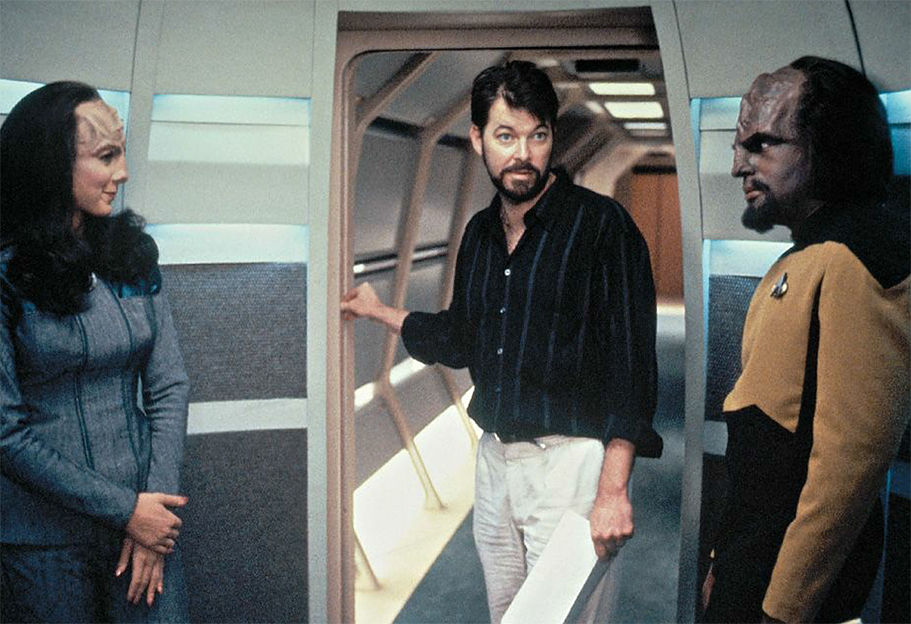
Evelyn Reid: Just to go back to what you were saying earlier, CBS Paramount are not ready, not comfortable going forward with a new series.
Jonathan Frakes: The focus of CBS Paramount, which owns the Star Trek franchise, is on the series of films that J.J. Abrams is making, which by the way I think are brilliant and I think he’s a great storyteller. And by virtue of those films being peppered gradually to the audience every three or four years, the hunger and appetite for the films grows and the campaign to go see the next Star Trek movie is the focus. To get a new Trek on TV, they can’t see [it]… I think they look back at how watered down the franchise was when we made Star Trek: Nemesis and realize it’s not a good… what is the word I’m looking for… business plan! It’s not a good business plan.
Evelyn Reid: The timing is not there.
Jonathan Frakes: Oh no, it’s the focus. Focus. It’s like the Bond movies. There’s no James Bond other than the James Bond movies. And when a Bond movie comes out fans, it makes X dollars because Bond fans have been waiting for a Bond movie for four or five years. And that’s exactly what they’re doing with Trek.
Evelyn Reid: So it has nothing to do with dwindling production budgets. Everywhere you look, money is tight.
Jonathan Frakes: But not on J.J.’s movies. Not that I’m bitter, but what we got to make four movies, he got to make one.
Evelyn Reid: Makes you wonder what you could pull out of your hat if you had that kind of cash.
Jonathan Frakes: Exactly.
Evelyn Reid: Which makes me wonder… business plans change. They evolve. What would it take for fans to convince you that there is an appetite and that it’s worth giving a new project a Kickstarter try?
Jonathan Frakes: We need a script. We need a script that everyone would believe in. If we had a solid script, then I think everyone would be thrilled to make another TNG movie.
Evelyn Reid: Well, thank you so much Jonathan for taking time out to chat. I unfortunately have to cut this short. Need to get ready to chat with Marina [Sirtis].
Jonathan Frakes: Give the lovely… give my imzadi my best!
Evelyn Reid: Sorry?
Jonathan Frakes: My imzadi. She’s my imzadi.
Evelyn Reid: My imzadi… ?
Jonathan Frakes: You dunno imzadi??? You watch the show and you don’t know about imzadi?!
Evelyn Reid: [Turning beet red]. I’m never gonna live this one down.
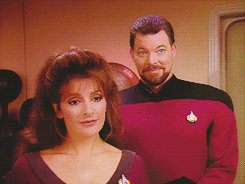
Jonathan Frakes Interview: On Star Trek Politics, Illegal Productions & Next Generation Reunions
by Evelyn Reid
Originally Published on About.com September 9, 2014
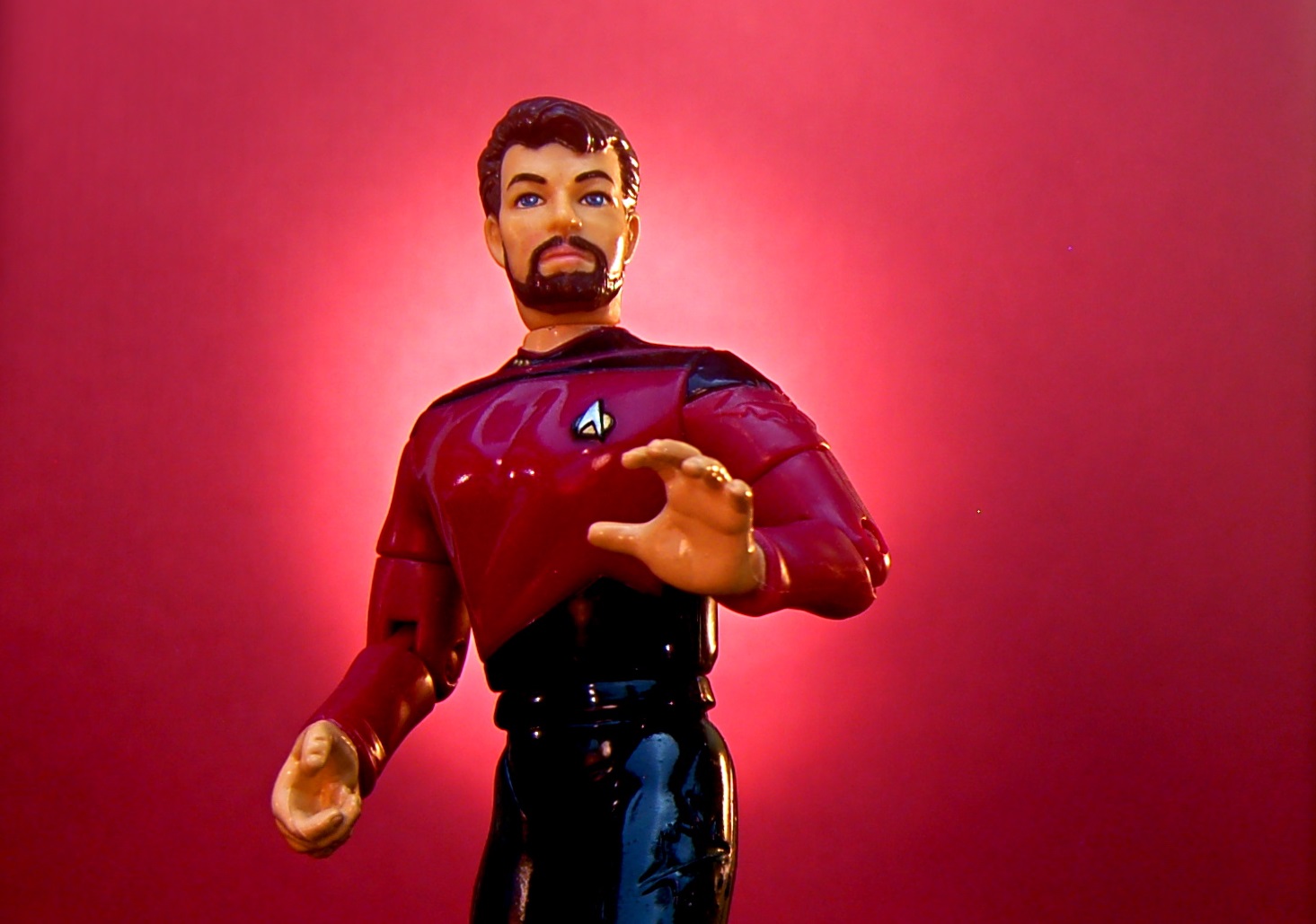
Photo by Flickr user JD Hancock (CC BY 2.0)
Having had the opportunity to talk with (and get chastised, Riker-style) by Star Trek: The Next Generation actor/director Jonathan Frakes prior to his appearance at the 2014 Montreal Comiccon where he joins the whole cast of TNG for a special group panel event, we delved into everything from Frakes’ thoughts on the proliferation of independent Star Trek shows and webisodes to the story behind his infamous ‘walk’, the one even Chris Farley spoofed on Saturday Night Live in 1994.
And in the name of hope springing eternal, I got an answer to the question every TNG fan wants answered: what would it take to get the cast of Star Trek: The Next Generation back on the big screen?

Jonathan Frakes: Evelyn Reid!
Evelyn Reid: Jonathan Frakes! May I call you Jonathan?
Jonathan Frakes: Of course.
Evelyn Reid: First of all, Jonathan, thank you taking the time to chat. I realize you’re very busy. Lots of Comiccons, last week’s Fan Expo and other circuits happening! There’s so many of them. I dunno how you keep up.
Jonathan Frakes: [Laughter].
Evelyn Reid: You know, we haven’t seen you in Montreal in a while now. When was the last time?
Jonathan Frakes: I don’t know that I’ve been there for a convention. I’ve visited [Montreal] because my wife worked with somebody from outside of Montreal when she was on All My Children. Jean Leclerc. But I dunno… it’s been long time, let’s put it that way.
Evelyn Reid: Hmm, I have on pretty good authority from someone who attended a Montreal sci-fi convention around 1993 or 1992, give or take. He swears that you were there.
Jonathan Frakes: That follows.
Evelyn Reid: Was a long time ago.
Jonathan Frakes: God knows the Godfather of us all has a building named after him here.
Evelyn Reid: [Laughter]. That he does. On topic, I’m just a few blocks away from the house William Shatner grew up in. So Jonathan, getting back to the Comiccon circuit, you have a lot experience with it. I mean, you were already on the circuit easily 25 years ago when you were shooting Star Trek: The Next Generation (TNG). With that being said, what do you enjoy most about the experience? What does it for you at these kind of events?
Jonathan Frakes: Well, first of all, it’s astounding to me that, 28 years later, people are still interested in coming out to see us. That alone is a blessing.
Evelyn Reid: Well I can tell you that not a week goes by where I don’t watch at least an episode.
Jonathan Frakes: Isn’t it amazing that you can still watch those shows, that they hold up? That’s a credit to the writing.
Evelyn Reid: A credit to the writing, a credit to the acting, a credit to the cast and crew’s rapport. You know, I wonder if it has something to do with substance… TNG and the Star Trek franchise overall are not afraid to look at shades of grey whereas mainstream entertainment these days and perhaps even in general? It’s about the black and the white. The plots are simple. Easy. Boring. Characters? You’ve got good guys and you’ve got bad guys. But with Star Trek: TNG, there’s the in-between. There’s a lot more subtlety in there to make you pause and reflect on whether you’re seeing things for what they really are.
Jonathan Frakes: Well that was Roddenberry’s vision, you know. He asked questions and used the format of this 24th century spaceship [to examine them]. He was very interested in exploring the human psyche. He’d touch everything except… he avoided talking about God. But generally, there was no subject off base for him.
Evelyn Reid: And even then he’d flirt with God. There were episodes that went there, one in particular comes to mind that looked into how a primitive culture might even form a concept of God.
Jonathan Frakes: Was that episode after he died?
Evelyn Reid: I don’t know offhand. I can’t remember what season it was. [Ed note: it was the fourth episode of Season 3, just prior to Roddenberry’s passing]. It was the one where the Prime Directive was violated—usually, those are pretty interesting episodes—and there was concern over the fact that this primitive culture, a pre-warp civilization, accidentally saw some of the Enterprise’s “magical” technology and started to believe that Captain Picard was some sort of God.

Jonathan Frakes: Oh I remember that! Yeah. Patrick loved that.
Evelyn Reid: [Belly laugh].
Jonathan Frakes: [Belly laugh].
Evelyn Reid: You know, when I was in high school in the ’90s, sharing how much you love TNG was not exactly the ideal topic of conversation. You didn’t broadcast your geekdomness, lest you risk becoming some sort of social outcast. But is it just me or have the tables turned? Have Comiccons and Star Trek become something that is not just socially acceptable, but cool?
Jonathan Frakes: You are not wrong. It’s a constant amazement to me. Now not only is it mainstream… it, it started with Third Rock and The Big Bang Theory, but now, it’s cool to be a geek. My daughter is in high school now and the nerds and the geeks? They’re the coolest people in school.
Evelyn Reid: That’s amazing.
Jonathan Frakes: And now we’ve got, pardon the pun, the next generation of fans coming out. A lot of people come in with their kids and say, “I’ve got my kids on Netflix watching your show,” and the kids will say [to me], “you look a lot older but you look like the guy from that show.” [Laughter].
Evelyn Reid: So the generation after the Millenials are also catching on to TNG?
Jonathan Frakes: They are if their parents have sat them down in front of [an episode]. If they’ve been fed it and it speaks to them, they stick with it. It is SUCH a treat for us. It’s amazing, just amazing that people still come out for us.
Evelyn Reid: And it amazes me that I don’t get bored, that TNG keeps speaking to me. I can keep watching the same episodes and never tire. Well, okay, not every episode. Some feel like the writers were having a bad day or didn’t have enough time to flesh things out…
Jonathan Frakes: They can’t all be home runs.
Evelyn Reid: Exactly. On topic, one of my questions later on when we wrap up our chat has to do with TNG’s original cast and whether we’ll ever you see you, all of you, together again on screen. But before we get there, I wanted to talk about this Star Trek spinoff movement, like Star Trek: Renegade for example. There’s also been talk of Michael Dorn’s spinoff efforts with Captain Worf. Independent producers and web series are popping up here and there. But chances are they won’t have the kind of production budgets that TNG had back in the day. Something everyday folk might not be aware of is how extensive your experience is behind the scenes, as a director, in addition to your work as an actor. With that experience in mind, do you have any advice for independents toiling to get their projects off the ground and who just won’t have the kind of budget previous series had?
Jonathan Frakes: Well, I took a Star Trek project to Paramount, to CBS, and they said, “you know what? We’re not gonna do this. We’ve already turned Shatner down, he brought one, Bryan Singer brought one… we love you guys but we’re not entertaining any new Star Trek television.” So people have gone to the internet and people have gone underground to make [something happen]. You know, they’re honoring the show, but they’re making it illegally, so I’m not sure what the answer is.
Evelyn Reid: Crap. Are they? I didn’t realize rights weren’t being cleared.
Jonathan Frakes: If they’re using the characters who were created without paying the writers who created those characters, if they’re filming and using the words “Star Trek” and not paying Roddenberry, that’s illegal. So there’s all kinds of shit going down that as a union man, that’s why I’m not involved.

Evelyn Reid: I didn’t realize it. And I should know better considering I deal with plagiarism, copyright infringement and intellectual property issues on a regular basis. So what’s the latest?
Jonathan Frakes: Right. Now I know Tim Russ (Tuvok from Star Trek: Voyager) created a Star Trek-feeling show but once you use the words “Star Trek,” that’s a licensed name, [licensed intectual property] that CBS owns and if you use “Riker” or “Troi,” those were characters created by writers, by the the Roddenberry estate. It’s a very… there’s a grey area. And part of the reality is that Paramount and CBS are so thrilled with J.J. Abrams’ reboot movies and the fanbase is so strong that they don’t want to spread the seed the way they did when they had Next Generation, Deep Space Nine, Voyager, Enterprise and Star Trek: Nemesis as a movie out there at nearly the same time… there was so much Star Trek that Star Trek: Nemesis bombed and that was it. That was the end of our run.
Evelyn Reid: Yet ironically, Star Trek: Nemesis had such a poignant theme: nature versus nature, terrorist or freedom fighter. I don’t understand why fans didn’t like it. The film had such depth to it, it was relevant, it challenges our everyday perceptions of what is good and evil. And its examination of cloning at a time when it was a hot topic in the news…
Jonathan Frakes: I know. And it was written by John Logan, one of the greatest living TV and movie writers. The idea wasn’t that the film wasn’t good, it was that nobody showed up in theatres. It was the tenth Star Trek movie and it was the first Star Trek movie that didn’t make money. That’s where the decisions are made.
Evelyn Reid: Would you ever consider starting a crowdfunding campaign yourself? Considering the licensing issue, say you were to do everything by the book with the help of the franchise’s fanbase. Say every fan gave $10, could you realistically put something together? [Ed note: roughly 30 million people worldwide watch Star Trek programming every week. If only 10 million of those people donated $10 each, that would amount to $100 million, which is two thirds of the first reboot film’s production budget right there]. I mean, look at what LeVar Burton did with Reading Rainbow.
Jonathan Frakes: Isn’t that amazing? He got $5 million bucks.
Evelyn Reid: Astounding. And to think the government rejected Reading Rainbow, if indirectly. But the support for Burton’s Kickstarter campaign speaks volumes. And LeVar proved his point, going out there and ostensibly thinking, “you don’t want to fund it? Fine. But you know what? People WANT [Reading Rainbow] to exist.”
Jonathan Frakes: So proud of him.
Evelyn Reid: What if you did the same? Is this something that the cast of TNG could do?
Jonathan Frakes: I don’t know know if there’s an appetite. You know, if there was an appetite, I frankly think that Dorn’s project would have gotten off the ground and Tim Russ’ project would have gotten off the ground in a bigger way. Vic Mignona built sets in Georgia that are clones of the original series sets and they’re redoing episodes… there are a lot of people out there making, as you said earlier, Star Trek episodes or webisodes and if there were an appetite for a Next Generation project, we’d all love to do it.
Evelyn Reid: But how do you determine if there’s a sufficient appetite for TNG?
Jonathan Frakes: Well, we’d love to do it.
Evelyn Reid: A lot of fans would be thrilled if you did it. I want to get back to this key question later, but I also want to talk more about your production skills behind the scenes. I was watching some footage of you shooting the breeze with Marina Sirtis (Counsellor Troi on TNG)…
Jonathan Frakes: …oh, when we’re talking about Rikers in space?
Evelyn Reid: No, it was at a 2012 conference. The one where she was making fun of your shoulder thing…
Jonathan Frakes: The walk. She was making fun of my walk?
Evelyn Reid: The walk. I’ve always wanted to ask you. Where does it come from?
Jonathan Frakes: I stole that walk from a wonderful actor whom I emulated named John Cullum. He walked a little bit like John Wayne. And at some point, I just stole the walk and made it mine.
Evelyn Reid: And it just turned into a pop culture phenomenon from there. I remember doing that walk when I was 16. But to get back to Marina, she also said that in the 36 years of her career, you were the best director she’s ever worked with. What is it that you do that resonates so positively with the actors you direct? Marina’s compliment isn’t the first one I’ve heard about with regards to your directing skills. I even chatted with an extra who spoke so glowingly about you, as if you were the glue on the set.
Jonathan Frakes: I think part of it is that I love it so much. You know, I speak “actor.” I’m a recovering actor so I know the pain, I know the insecurities and I know some of the needs. I love actors and I think that really helps directors.

Evelyn Reid: Just to go back to what you were saying earlier, CBS Paramount are not ready, not comfortable going forward with a new series.
Jonathan Frakes: The focus of CBS Paramount, which owns the Star Trek franchise, is on the series of films that J.J. Abrams is making, which by the way I think are brilliant and I think he’s a great storyteller. And by virtue of those films being peppered gradually to the audience every three or four years, the hunger and appetite for the films grows and the campaign to go see the next Star Trek movie is the focus. To get a new Trek on TV, they can’t see [it]… I think they look back at how watered down the franchise was when we made Star Trek: Nemesis and realize it’s not a good… what is the word I’m looking for… business plan! It’s not a good business plan.
Evelyn Reid: The timing is not there.
Jonathan Frakes: Oh no, it’s the focus. Focus. It’s like the Bond movies. There’s no James Bond other than the James Bond movies. And when a Bond movie comes out fans, it makes X dollars because Bond fans have been waiting for a Bond movie for four or five years. And that’s exactly what they’re doing with Trek.
Evelyn Reid: So it has nothing to do with dwindling production budgets. Everywhere you look, money is tight.
Jonathan Frakes: But not on J.J.’s movies. Not that I’m bitter, but what we got to make four movies, he got to make one.
Evelyn Reid: Makes you wonder what you could pull out of your hat if you had that kind of cash.
Jonathan Frakes: Exactly.
Evelyn Reid: Which makes me wonder… business plans change. They evolve. What would it take for fans to convince you that there is an appetite and that it’s worth giving a new project a Kickstarter try?
Jonathan Frakes: We need a script. We need a script that everyone would believe in. If we had a solid script, then I think everyone would be thrilled to make another TNG movie.
Evelyn Reid: Well, thank you so much Jonathan for taking time out to chat. I unfortunately have to cut this short. Need to get ready to chat with Marina [Sirtis].
Jonathan Frakes: Give the lovely… give my imzadi my best!
Evelyn Reid: Sorry?
Jonathan Frakes: My imzadi. She’s my imzadi.
Evelyn Reid: My imzadi… ?
Jonathan Frakes: You dunno imzadi??? You watch the show and you don’t know about imzadi?!
Evelyn Reid: [Turning beet red]. I’m never gonna live this one down.



